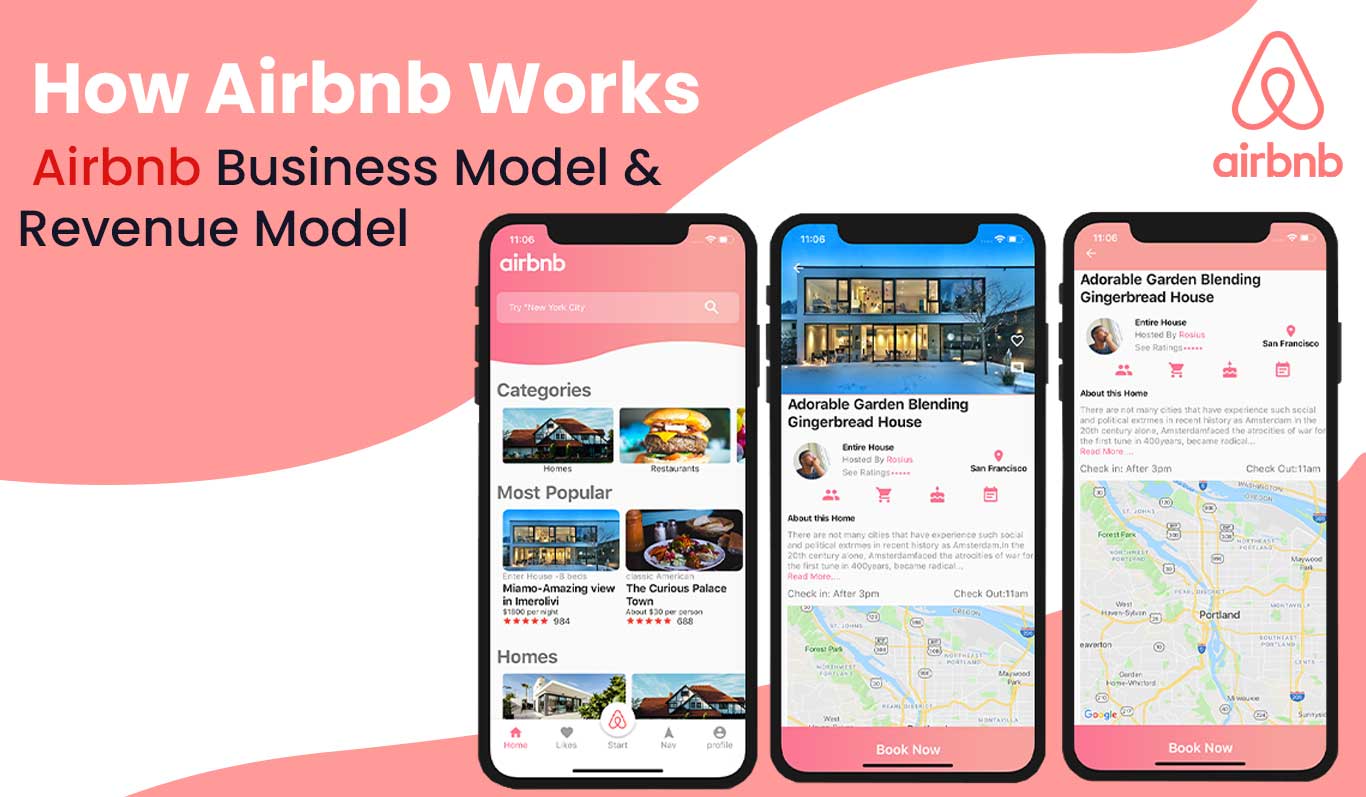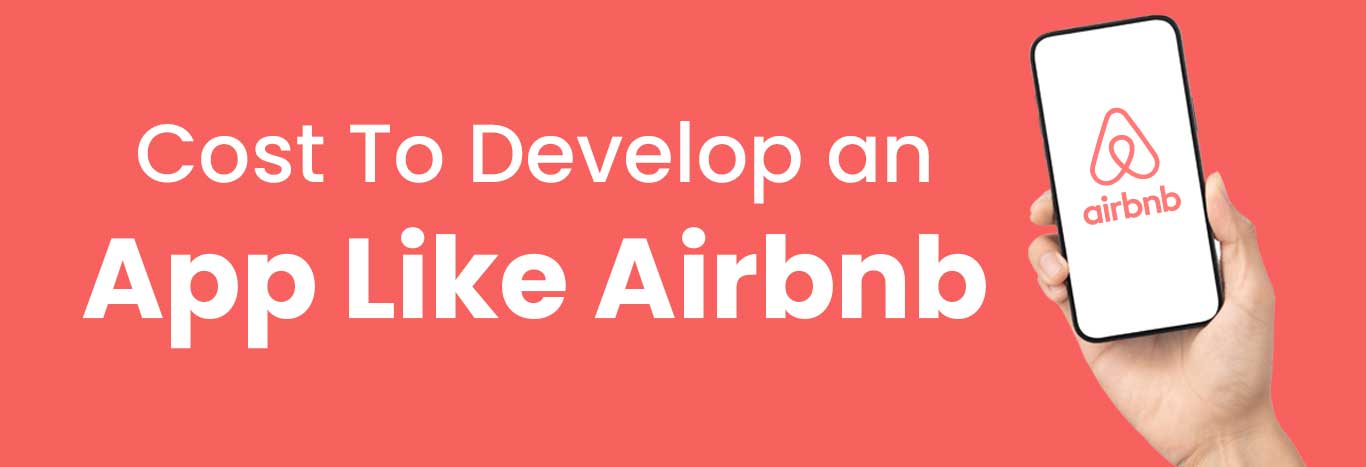How Airbnb Works: Airbnb Business Model & Revenue Model

Within few years, Airbnb has quickly climbed the success ladder because to its unique service. The platform is built on the concept of peer-to-peer sharing, allowing individuals to rent out their homes or rooms to travelers in need of a place to stay. Airbnb's unique business model, which includes a commission-based revenue structure and a focus on providing a seamless and convenient booking experience, has proven to be both popular and profitable.
Currently, Airbnb has 2.9 million hosts and more than seven million listings in more than 200 countries. Six renters check into an Airbnb-listed house on average every second, with the website having more than 150 million members.
Airbnb is a technology company that operates a popular online marketplace for short-term rentals. Airbnb was founded in year 2008. Airbnb has become one of the largest providers of alternative accommodation options for travelers, offering a wide range of properties, from shared rooms to entire homes, for rent.
With millions of listings in hundreds of countries around the world, Airbnb has established as a major player in the travel and accommodation industry and it continues to grow and innovate.
What is Airbnb Business Model?
Similar to Grubhub, Airbnb operates on an online platform that links each component in the business model. Airbnb's business model is based on providing a two-sided online marketplace that connects people looking for short-term accommodation with those who have spare rooms, apartments, or homes to rent out.
Airbnb's business model is designed to facilitate trust and communication between the host and guest, and to make the process of booking and staying in a rental property as seamless and convenient as possible.
Airbnb Revenue Model
Airbnb's revenue model is primarily based on commissions from each booking made through the platform. The company charges a service fee to both the host and the guest, typically around 3% of the booking value for the host and between 6% to 15% for the guest. Airbnb also offers premium features such as vacation rental property management services and professional photography, for which they charge extra fees.
These additional services provide additional revenue streams for the company. Airbnb's revenue model is designed to generate income from a variety of sources, including service fees, premium features, and advertising. The company continues to innovate and expand its offerings to maintain and grow its revenue.
Airbnb Market Segmentation
Airbnb's market segmentation targets both travelers looking for short-term accommodation and hosts looking to rent out their properties.
For travelers, Airbnb targets a wide range of segments including:
-
Budget travelers looking for affordable accommodation options
-
Business travelers looking for short-term housing solutions
-
Adventure seekers seeking unique and local travel experiences
-
Family travelers looking for spacious and family-friendly options
-
Group travelers looking for large properties to accommodate their group
For hosts, Airbnb targets a wide range of segments including:
-
Homeowners with extra rooms or properties they want to rent out
-
Landlords and property managers who want to rent out their entire properties or multiple listings
-
Small business owners seeking to monetize unused spaces
By targeting such a diverse range of segments, Airbnb is able to cater to a wide range of customer needs and provide value to both travelers and hosts.
Cost To Develop an App Like Airbnb

Airbnb is a company that provides a platform for people to rent out their homes, apartments or even just a room, to travelers. The revenue model of Airbnb is based on commissions from each booking made through the platform. Airbnb also offers premium features such as vacation rental property management services and professional photography, for which they charge extra fees.
The cost to develop an app like Airbnb will vary greatly depending on a number of factors, including the features and complexity of the app, the region where the app is being developed, and the experience level of the development team.
On average, the cost to develop an app like Airbnb can range anywhere from $45,000 to $250,000 or more. The exact cost will depend on the specifics of the project, but it typically includes expenses such as:
Design: The cost of designing the user interface, logos, and other visual elements.
Development: The cost of building the app, including both front-end and back-end development.
Testing and Quality Assurance: The cost of testing the app and fixing any bugs or glitches.
Project Management: The cost of managing the project, including assigning tasks to the development team and monitoring progress.
Server and Infrastructure: The cost of developing the app and setting up the necessary infrastructure to support it.
Ongoing Maintenance and Support: The cost of maintaining the app and providing ongoing support to users.
These costs are just rough estimates and that the actual cost to develop an app like Airbnb will vary depending on a number of factors. To get a more accurate estimate, it is best to consult with a top app development company.
- Airbnb's cost structure primarily consists of the following components:
Technology and Development: This includes the costs associated with maintaining and improving the platform, including software development, data storage, and website hosting.
Marketing and Advertising: Airbnb spends heavily on marketing and advertising to attract new customers and build brand awareness.
Customer Service and Support: The company provides 24/7 customer support to both hosts and guests and employs a large customer support team to handle inquiries and resolve issues.
Payment Processing: Airbnb uses third-party payment processors to handle all transactions made through the platform, incurring fees for each transaction.
Salaries and Benefits: The company has a large employee base, and salaries and benefits make up a significant portion of its cost structure.
Legal and Compliance: Airbnb must comply with a variety of legal and regulatory requirements and must incur legal fees to maintain compliance.
Property and Liability Insurance: Airbnb offers property and liability insurance to both hosts and guests to protect against damages or losses during a booking.
Future of Airbnb
The future of Airbnb is uncertain, as the company faces a number of challenges and uncertainties in the coming years. However, there are a few key trends and developments that are likely to shape the future of the company and the short-term rental industry more broadly.
Increased Competition: Airbnb faces increased competition from traditional hotel chains, as well as from newer players in the short-term rental space.
Economic Uncertainty: The global economy is facing a number of challenges, including rising interest rates, increased inflation, and trade tensions, which could have an impact on the demand for short-term rentals.
Technological Advances: Airbnb is likely to face new competition from other startups and established companies that are leveraging new technologies, such as AI and blockchain, to create new and innovative offerings in the short-term rental space.
Despite these challenges, Airbnb is well positioned to continue to grow and innovate in the years to come. The company has a strong brand, a large and loyal user base, and a proven business model, and it is likely to continue to play a significant role in shaping the future of the short-term rental industry.
The future of Airbnb will depend on its ability to navigate the challenges and uncertainties of the short-term rental space, and to continue to innovate and evolve its business model to meet the changing needs and demands of its customers.
Conclusion
Airbnb is a successful and innovative company that has disrupted the traditional hotel and hospitality industry. The company's unique business model, which connects travelers with people who have spare rooms or properties to rent out, has proven to be very popular and has grown rapidly.
Airbnb's revenue model, which is based on commissions from each booking made through the platform, has proven to be profitable, and the company continues to explore new revenue streams through premium features and services.
Airbnb's market segmentation strategy, which targets both travelers and hosts, has allowed the company to cater to a wide range of customer needs and provide value to both its guests and hosts.
We are a leading web and mobile app development company with 4+years of delivering outstanding and unique apps. We understand the needs of the industry and customize the app, to provide you with a best app development for your company.
Request a Quote
Categories
Popular posts
Best Practices for Software Product Engineering Every CTO Should Implement
2023-14-18How to Build Your Own On-Demand Carpooling App Services?
2023-08-25How to Start an On-Demand Fuel Delivery Business: A Comprehensive Guide
2023-07-28Empowering Miners: How Fleet Management Apps are Transforming the Mining Industry?
2023-07-21A Complete Guide to Develop a Food Delivery App for Restaurants in 2023
2023-07-08Mobile Apps Transforming the Travel Industry: A Game-Changer in Travel Planning and Experience
2023-07-07
